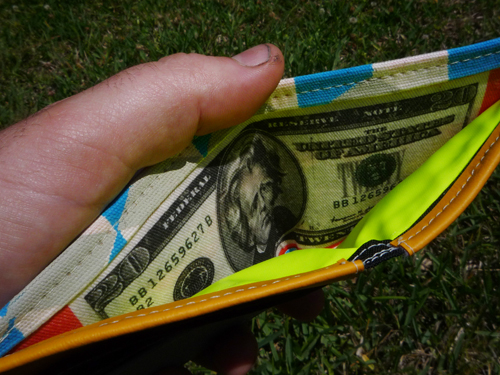Here’s a warm welcome to those visiting from the Hallmark Channel’s Home and Family show.
We ran out of time for our “fun” fall budgeting segment, but here is a little more info on that dreaded topic – budgeting.
Friends, for this Type Z (yes, as opposed to Type A) personality, this next topic is one of the hardest lessons that I had to learn.
I’m a free spirit and never did I think I could do this. But after our year of unemployment and coming face to face with really tough financial circumstances, I couldn’t NOT get a handle on exactly where every dollar was going.
Giving Every Dollar a Job is one of the most important financial decisions one makes to get their family finances in order. Yes, budgeting is back, and you thought I forgot about this dreaded “B” word topic after my last post, didn’t you? I didn’t. 😉
With unemployment on the rise and so many people looking for jobs, what in the world does it mean to give our dollars a job?
Dollars are told what to do, and every dollar in our budget needs to have a task. There’s such freedom in understanding and figuring out what that means for your family.
Too often with traditional budgeting, one looks at last years expenses, guestimates the amount needed for each category, and then assumes, if spending around the same dollar amount, our budget will come in on track. That ends up being a problem, and we can’t understand how we got so off base. Even though we think we have a plan and are being specific, it’s too loosey goosey.
Budgeting for the big things – food, mortgage, insurance, car, etc, and then have these very general over flow category such as “savings” or “incidentals,” is a recipe for a budgeting flop. I don’t know about your family, but in ours, life is a series of incidentals, and having these two sweeping categories just doesn’t work. Breaking them down and becoming very specific is key.
Setting a budget may take months to get right, and it needs to be worked and reworked for your family. During your first few months, you’ll need to track and reevaluate every dollar. If you’re in serious debt, I highly recommend the accountability of looking daily at every dollar spent, then weekly, and eventually monthly. Daily may seem like an overkill, but if you take the time to add up how much your daily interest is costing you, the 30 minutes a day of planning adds up to quite an incentivizing price point. Debt occurred with one day, plus one day, plus one day and you need to be willing to put the time into replaying and restructuring those days.
Finding a budget that works for you comes from getting down and dirty. It comes with being specific, digging deep and really telling your money where to go. When initially working your budget, don’t let that left over $100 go unassigned. You must give it a job!
The reason budgets don’t work is that people have unrealistic expectations. It seems so easy when it’s put down on paper, doesn’t it? From reading previous comments, it’s the reality of following that budget that brings the trouble. (We’ll get into various ways to make it work in another post.)
For instance, determine what “incidentals” entails and name them. For parents, it may be these birthday parties our kids get invited to, and the expectations that ensue for presents. Seriously? Who ever budgets that much for those? That can get you into trouble. How about the nail you ran over last week, and the necessary new tire (even though you just put new ones on a few months ago.) We don’t just have a car category. We have a “our van is in serious trouble and will undoubtedly need repairs” category. Now, as much as it pains me to put money into it, break downs don’t catch me by surprise. Hopefully, I don’t have to touch that “repairs” category, but if I do, it’s there.
How about the “savings” category?
Determine “what the “job” is of this savings? Are you investing? Saving for a dream home addition?
Trying to pay off one extra mortgage payment a year? Then give those dollars a task and make them work for you, by hopefully recruiting new dollars if you’re doing it right. If you’re just starting out, savings may be an elusive dream, but don’t worry, you’ll get there and I’ll scream for joy with you once you add in these jobs. It took us 17 years to finally build our dream front porch, but we’re enjoying it now and paid cash.
Remember, give every single solid dollar a specific category. You determine what that category is based on the priority it holds within your budget.
Everyone is different and this is where you need to be honest with yourself, if you’re going to make this budget work for you. If a Starbucks splurge is a frequent priority, then one category should be “Starbucks.” Don’t just pretend that you don’t spend that amount, claim it as a priority and name the category.
Determine exactly how much will be spent there during the month and stick to it. (You may be surprised.) Yard sales are a huge part of my budget. I have a specific yard sale ( spring/summer) and thrifting (fall/winter) category. If I didn’t, money would fly through my fingers every Saturday morning because every thing is a great deal. I am not going to put $10 a week into that category, and try and pretend that is a “good girl” number when I know that often I spend way more than that amount. I have spent $50/week, which may seem astronomical to some, but this is where one needs to be honest with their budget, name that it as a category and put in the amount, not only that you can afford to spend, but one to which you will stick. If that’s $10/week for you, then only take ten dollars cash.
When the money is gone, it’s gone. No excuses, no negotiations.
The value in budgeting like this is that you have accounted for every penny you have in your budget. The act of sitting down and setting specific numbers is tremendously valuable because you’re actively making decisions, rather than letting things happen. You’re taking control of your money situation, rather than it controlling you. Money may be tight, but your finance will not take you by surprise every month sending you into a perpetual state of panic.
The two highest spending months are ahead of us. There is NO BETTER time to get down and dirty than right now. You do not want to have regrets in January. Let’s ring in this year with sweet bells and whistles, not Visa and Mastercard statements.
For more financial encouragement for families, continue to browse. Read the comments for additional insight from others on this topic.
(This is a repost.)









This is just a fabulous post. I can attest to the fact that the more specific your budget categories, the greater chance of success your budget will have– we’ve done it both ways, and specific and intentional wins!
I alos want to second being honest about how much you spend in certain categories. And that can be really uncomfortable. And when we confront a high dollar Starbucks habit, or overspending on craft supplies, or whatever the thing is, that honesty might also compel us to make some changes. But we can’t either stick to a budget or adjust our spending if we don’t get real about where those dollars are flying to.
What I have told others is that as uncomfortable as those moments are, and as tough as those budget setting meetings are, those feelings are much better than the merry go round of worry, guilt, spending shame and cluelessness I was riding each month pre-budget.
[Reply]
Thank you for this post this morning…Just what I needed! I recently quit a very good job to stay home with my baby girl. We have never really budgeted before as we were very blessed to both have great jobs that provided cars, car insurance, and wonderful health coverage and our mortgage and land payments were our only debt. We were able to get in a good place but at the same time we never really thought about where our money was going and I regret that now. Now that we are living on one income we see that a budget is an absolute necessity. We recently set up a budget and November will be our first month to try it out. Your post was the perfect inspiration I needed as we begin this month on a budget! I am so thankful I found you a few weeks ago!
[Reply]
I find it helpful to think of money as what it really is, fundamentally, the item we use to transfer energy. I give you $ to do something or make something for me, etc. I work (expend energy) for my $, so we are trading energy.
Just like conserving engery in heating and electricity, it really is good to conserve your energy as much as possible, rather than just give it away without thought. And a budget helps you carefully consider where you spend your energy.
[Reply]
I absolutely love this post!
We finally bit the bullet and decided to go on a budget about two years ago. We actually got rid of credit cards, wrote checks for bills and paid cash for everything else. It’s allowed us to have absolutely no consumer debt and save the money to completely gut and remodel the basement this fall – with cash!
While budgeting definitely takes work and self discipline, I will never be without one again! I completely agree with you about being incredibly specific and honest with yourself about what you spend. That makes a huge difference!
[Reply]
I think you nailed it. You need to know were your money is going, plan for the extras and be flexible with the budget because it will change and needs to change as your spending habits do. In the past we have budgeted spend money for ourselves, cash only, and we use it for whatever we like. But once it’s gone, it’s gone. We started with $20 and once we paid off some thing went to $40. It really helped us to see what we were spending our money on and gave us the freedom to make small splurges without affecting the budget or feeling guilty.
[Reply]
Hey Jen!
Thanks for this post. I actually took the last couple of hours and set our spending amounts in Excel sheet. Also tried to figure out how to bring in extra dollars this month to boost our income a little for Christmas gifts and such. I am also, reducing our food spending for this month and eating out of pantry and freezer (since they are stocked). We’ve already have Thanksgiving and garage sale seasons are over… so that will help!
thanks Bette
[Reply]
It’s much better to be specific. We paid our house of years sooner with that kind of plan. Good post.
[Reply]
Love this advice. Budgets at first can seem like bondage but really bring freedom in time
[Reply]
I love the idea at setting up a budget but I worry about the motivation factor. I can see myself doing it for a couple of months and then it fizziling. How does one stay motivated to continue to do this and to movate your husband to sit down and do this with you.
[Reply]
My husband and I have been creating and following a specific budget for almost two years now, with a lot of success–we’ve cut our groceries by about 30%, identified problem area, and been able to make thoughtful choices. We sit down together an hour or so with coffee each week–he plays with the spreadsheet and logs receipts while I write out bills, and we talk and compare notes. That’s worked pretty well.
However, two areas are causing us a lot of problems–medical costs, as our insurance deteriorates each year and family members have severe allergies/asthma/anxiety…and car repair–in the last 3 months, each car had over $1,000 of work by our very reputable mechanic. On top of the orthodontia for two which we did expect. I know we need to save for car expense, as well as for replacement, but havn’t figured out how to keep up with this. Any ideas?
[Reply]
Thank you for this post today! My husband and I started Dave Ramsey’s program a few months ago and giving every dollar a job has completely changed the way we budget. Just this morning I was moving dollars around to our snowball because our power bill was lower than expected thanks to a warm October! A very good reminder for us to stay on track and plow thorugh these next two months so that we can start the new year off with no holiday regrets and still be on budget!
[Reply]
The best budgeting software I have found and used for years is: (ok I won’t leave a link, because that isn’t cool) Google “Jesse Meacham budget” and his software will pop up. His budget really follow’s Dave Ramsey’s philosophy. We have been able to pay off over 30 K in debt in two years just using a budget. It’s all about knowing where exactly your money is going and where you actually want it to go. Loved the post!
[Reply]